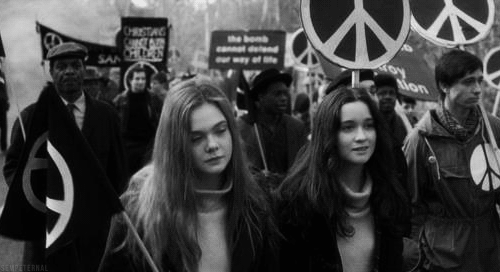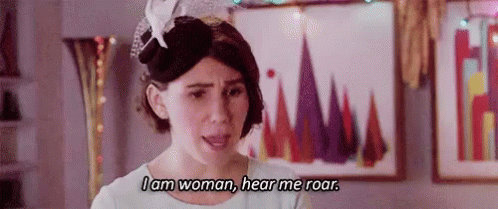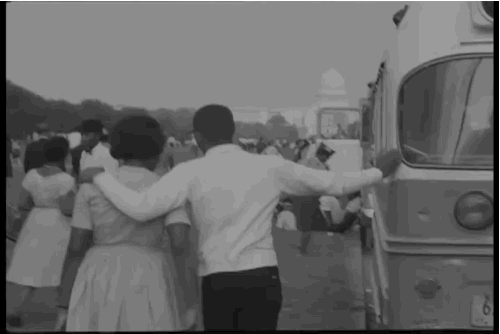Do NOT Let The Women's March Become Temporary Activism Bullsh*t
The Women’s March has to do more than just fill our newsfeeds for a weekend or it will be useless.
 getty
getty I'm both intrigued by the Women’s March on Washington on January 21st and, admittedly, rather terrified. The stakes on this event in the immediate aftermath of the Trump Inauguration are high, and my apprehension that this brazen, collective energy will fizzle out as soon as the weekend is over is met with the realization that we may not have another chance to fully rekindle it after this.
Despite pop culture’s recent obsession with feminism, this centuries-old fight for claiming women’s rights has become so banal and riddled with infighting and exclusion that it risks stalling out entirely. The very last thing feminism needs as we transition into a Trump presidency is to be finally discredited by our own missteps.
My fear is that, while they will inevitably be sizable, this weekend's rallies will be a repeat of the Occupy Wall Street phase, which held the media’s attention long enough to be scoffed at but quickly lost verve due to unspecified demands and no concrete plans for follow-up action. I am deeply worried that this weekend’s Women's Marches will similarly be a flash-in-the-pan moment that will sate our feelings of powerlessness temporarily but won't effect any substantial change and, in doing so, will be remembered as an aimless, perfunctory joke.

Tumblr
By no means am I condemning the Women’s Marches, nor am I attempting to undermine their potential value; in fact, I have high hopes for what this weekend promises. According to the websites of the March and its "sister marches," these events are intended to be the dawn of a new rise in intersectional feminist solidarity as we organize to mobilize — all of which excites me.
Marches always have the power to catapult us forward, and I sincerely hope that the rallies in DC and sister cities successfully stir the energy of those fighting for women’s reproductive rights, equal pay, and sexual safety in preparation for the local and national battles still ahead of us. I see the potential for this weekend’s marches to be legitimately great if used as a jumping off point instead of just a singular action.
After all, the “I Have a Dream” speech was delivered at the 1963 March on Washington and its effects continue to ripple through to the momentum of the Black Lives Matter movement today. This weekend's protest, like the Women’s Liberation rallies of the 1960s and 70s, has the potential to rejuvenate the movement completely.
But the Women’s Marches have to do more than just fill our newsfeeds for a weekend or all of it will be worse than useless. If this event turns into nothing more than a superficial rage party for gals in pink cat-eared caps to chant vague demands in between posting selfies for an afternoon, we risk snuffing out our energy before we’ve even gotten a chance to use it proactively.
The same stands for all of us who aren’t planning to attend a rally, too, by the way. We have to focus our attention and commit to more than just one weekend or a few touch-and-go efforts in order to create a force that shifts the norm.

Tenor
As evidenced by the Egyptian revolution of 2011 and the ousting of the Guatemalan Vice President in 2015, social media — and Facebook, specifically — has proven itself to be an invaluable tool for orchestrating massive cultural revolutions. The problem, however, is that too often on these platforms, our activism ends with retweeting a hashtag and moving on to the next trending topic instead of utilizing the flow of information to propel us into palpable action.
Perhaps the most irritating example of this was the recent trend of millions “checking in” at Standing Rock on Facebook during the Dakota Access Pipeline Protests, an empty gesture that only served participants' narcissistic desire to appear socially conscious for the brief moment the conflict reached its climax.
Absentee activism is bullsh*t. Temporary activism is bullsh*t.
Putting a troubled country’s flag over profile pictures, posting a political rant to a social media audience, or even reposting socially conscious essays from our brightest minds are all powerful first steps but it's problematic to believe these efforts are all that is required to bring about change. Sharing information and coming together have to be considered the mere initiation stage for a bigger objective or there’s no point in spreading awareness in the first place.
The same, unfortunately, can be said about recent political marches. I remember watching massive protests happen around the world as millions begged the United States not to go to war with Iraq in 2002 only to be met with casual derision. That’s when I had the realization that throughout history, protests have only worked if they inconvenience the status quo and force the hand of the government into action.
While the Ukranian and Arab revolutions have been brilliant recent examples of civil disobedience in action, America also has a strong history of creating change through organized, peaceful disruption of government operation, beginning with our inception and carrying through to the protests of the Civil Rights movement, the filibustering of Wendy Davis, and, of course, crowds stalling progress at Standing Rock.

Primogif
Let me say it again for the people in the back:
It is not enough to let them see us en masse or hear us begging for policy change over and over. We've been yelling the same catch phrases at rallies for decades now. We will not change bureaucratic maneuvers by flooding Twitter with hashtags or showing our like-minded friends new feminist memes on Instagram.
Selfies at political rallies do not influence the wallets or will of the powerful and cannot act as currency. If we want to be taken seriously, we have to have our presence felt through the absence of our labor, funds, or participation.
It's time stop sharing mantras with each other and start collaborating on solid, direct plans of action.
For example, The Montgomery Bus Boycott set an ideal precedent for the public using its power to change policy simply by voting with its dollars and passive resistance. It will require massive actions like this in order to get politicians and the businesses in their pockets to pay attention. With a Presidential cabinet stocked with CEOs, now is the time to begin boycotting brands whose chairs work against our objectives, no matter how difficult. Let’s start there.
Every political shift propelled by grassroots protests requires discomfort, inconvenience, and a surrender of vanity. Revolutions require us to get our hands dirty and come together to share resources.

Gifsec
Ongoing protests will eventually be met with hostility that will deliberately attempt to weaken our spirits; a truth that remains regardless of the economic climate in which we fight. The women who fought for our rights to vote were often well-educated, wealthy women of high societal rank but they were beaten, raped, imprisoned, and murdered by authorities all the same.
Obviously, I hope our fight for equality does not come to extreme violence again; I believe in the merits of peaceful protest and civil disobedience. However, only physical, tangible action with concise demands motivate change. It will take all of us doing what we can, where we can, as a fearless, ongoing collective effort in order dismantle this patriarchy.
To cite Gil Scott-Heron's famous track, this revolution will not be televised (although it will probably be live-streamed), and we will not be able to stay home, comfortably watching change unfold with minimal participation. This revolution will require more than just a simple purchase at a merch table. It will not happen during a quick weekend getaway with your gal pals where you can sip rosé and rave about your Airbnb find. It will not be publicly lauded until much later — and only then if we are successful.
I salute every single protester marching this weekend and I encourage those leading the Women’s March in DC to radically facilitate inclusion, intersectionality, and accessibility. I'm taking my daughter to a sister march at my state's capital, and I have downloaded the Women's March Washington app in order to follow the events of the DC march closely.
I hope that this weekend marks the beginning of a renewed, mobilized, unified movement in which we can break down walls and finally leave this patriarchal paradigm of inequality in our wake.
Let's take to the streets and stay there until the job is done. I’m rooting for us.
